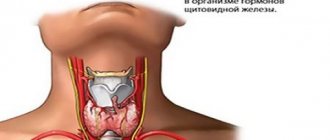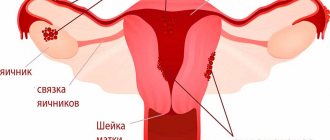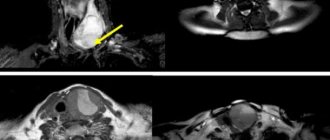Thyroid diseases are often associated with hormonal imbalance. Let's find out why thyroid hormones are needed and what problems can arise if their amount is underestimated or overestimated ALENA PARETSKAYA
Pathophysiologist,immunologist, WHO expertZUKHRA PAVLOVACandidate of Medical Sciences, endocrinologist, senior researcher at the Faculty of the Fundamental Clinic of Moscow State University, scientific director of the Clinic of Systemic MedicineELENA ZHUCHKOVAEndocrinologist "SM-Clinic"
Thyroid diseases are quite complex, their symptoms are variable and very individual. This means that thyroid problems will look different for each person, sometimes the patient has no complaints for a long time.
In any case, it is important to have a general understanding of how the thyroid gland works, why and what hormones it produces. This will help a person detect the problem in time, get tested and ask the right questions to the doctor. This data may also provide clues to some of the mysterious symptoms a person may experience in everyday life.
Key thyroid hormones are produced by the thyroid gland, an endocrine organ located in the lower, front part of the neck. Thyroid hormones enter the bloodstream and are distributed to all tissues of the body. They help us use energy from incoming food, retain and produce heat, stimulate the functioning of the brain, heart, muscles and other organs.
The production of thyroid hormones is controlled by another endocrine organ, the pituitary gland, which is located in the brain. The pituitary gland releases thyroid-stimulating hormone (TSH) into the blood to stimulate peripheral function. The amount of TSH that the pituitary gland sends into the bloodstream depends on the amount of peripheral thyroid hormone in the body. If the pituitary gland senses a decreased level of thyroid hormones, it produces more of them. As soon as their level in the bloodstream rises above normal, the pituitary gland stops producing TSH. Thus, the pituitary gland senses and controls the synthesis of thyroid hormones.
Which thyroid hormones should be tested?
Hormone tests can show levels of total (protein-bound) and free hormones.
“The highest priority significant hormone is thyroid-stimulating hormone (TSH), says endocrinologist Zukhra Pavlova. – It is synthesized in the brain and stimulates the thyroid gland, as well as the synthesis of the hormone thyroxine. Most often, doctors look at the amount of TSH, because it is the most indicative hormone - it reflects the insufficiency of the synthesis of thyroid hormones.
Most of the hormones in the blood bind to proteins - they help deliver them to organs and tissues. And only a small part of them is “free” to penetrate tissues, directly producing biological effects.
“The second priority is T4 free hormone, not associated with a carrier protein,” continues Dr. Pavlova. – When we want to determine the hormonal state, a disorder of the endocrine system and the thyroid gland, we look at TSH and T4. If TSH is high and T4 is still normal, it means that the disease is beginning to develop, but it is still without pronounced clinical manifestations.
T4 is the main form of thyroid hormone circulating in the blood (about 95% on average). To exert its effects, T4 is converted to T3 by removing an iodine atom. This occurs primarily in the liver and in certain tissues where T3 acts, such as the brain. T3 usually makes up about 5% of the thyroid hormones circulating in the blood.
“In cases of illness, doctors evaluate several factors,” says endocrinologist Zukhra Pavlova. – If there is a suspicion of an autoimmune disease of the thyroid gland, for example, the ultrasound doctor wrote in the ultrasound report that the patient has diffuse changes in the thyroid gland like thyroiditis, the doctor may prescribe tests for antibodies to the thyroid gland. If there is a suspicion of diffuse toxic goiter, tests for antibodies to thyroid-stimulating hormone receptors will be prescribed. These tests will help make the correct diagnosis and select adequate treatment.
Diagnosis in men
Blood for TSH is taken in a special diagnostic laboratory.
To carry out the analysis and obtain a reliable result, you need to properly prepare:
- Blood is taken from men in the morning on an empty stomach. The last meal before donating blood should not be less than 12 hours. For two days, spicy, salty and smoked foods, as well as alcoholic drinks and smoking should be eliminated from food. When visiting a bathhouse or sauna, you should postpone the donation of hormones to 1 day. You should not smoke 60 minutes before taking blood;
- You cannot donate blood after undergoing an X-ray or undergoing physiotherapeutic procedures;
- Avoid all physical activity and sports the day before the test , try not to get nervous and control your emotions. 10 minutes before the procedure, just sit and relax;
- Three days before the test, stop taking iodine-containing drugs , as well as 30 days before taking thyroid hormones, unless there are special prescriptions for this from the endocrinologist. When the goal is to find out the level of hormones in the blood, then there is no need to stop taking medications.
- Please remember that the result may not be reliable if you are taking medications or their metabolic products. Any drug is fraught with changes in clinical blood parameters and hormones. Before the study, you should consult with your doctor about possible withdrawal or reduction of the dosage of the medication. Do not take pills before donating blood;
- The laboratory may have various methods of examination and measurement of indicators . To get a high result, you need to take the test at the same time and preferably in the same laboratory.
TSH test
The best way to initially test your thyroid activity is to measure your TSH level.
Changes in TSH can serve as a kind of early monitoring system. It often changes in advance, even before the actual level of thyroid hormones reaches low or too high levels. High TSH is an indicator that the thyroid gland does not secrete enough T3 together with T4, which is possible with primary hypothyroidism. If TSH is low, this may indicate that the thyroid gland is too active and produces excess hormones, which is typical for hyperthyroidism.
Sometimes low TSH results from an abnormality in the pituitary gland that prevents it from producing enough hormone to stimulate the thyroid gland (central hypothyroidism).
Symptoms in men
Symptoms of elevated TSH levels in the blood are:
- Severe irritability;
- Constant insomnia;
- Sense of anxiety;
- Decreased vision;
- Tremor of the upper extremities;
- Increased fatigue;
- Nausea;
- Decreased appetite;
- Increase in body weight;
- Frequent constipation.
Sometimes an elevated TSH is simply an indicator of improper preparation for testing. Sometimes the TSH level increases after taking estrogens or cerucal, which significantly affect the indicator. Also, before the test, the man could have done a lot of physical activity. The level also increases after gall bladder surgery or after hemodialysis.
It is imperative to consult with an endocrinologist and, if necessary, receive qualified treatment in order to normalize the level of TSH in the blood.
Tests for T4
The total T4 test measures bound and free thyroxine (T4) in the blood plasma.
Free T4 is not bound to protein molecules; it can freely penetrate and act on body tissues. It is important to know that the overall T4 level is affected by medications and various pathological conditions. Estrogen, oral contraceptive pills, pregnancy, liver disease, or a viral infection (such as hepatitis C) are some common causes of increased thyroid hormone binding proteins, leading to high total T4 levels. Testosterone, androgens, and anabolic steroids are common causes of decreased thyroid hormone binding proteins, leading to decreased total T4. Sometimes, such as in pregnant women, there may be normal thyroid function, but the total T4 level is outside the normal range. Blood tests that measure the free T4 index can more accurately reflect how the thyroid gland is functioning under these circumstances.
Table: TSH norms
The level of thyroid-stimulating hormone in men depends on age. This dependence is presented in the table:
| Age | Normal indicator |
| Newborns | From 1 to 40 mU/l |
| 2 months | From 1.7 to 9.2 mU/l |
| 6 months | From 0.5 to 10.1 mU/l |
| 5 years | From 0.3 to 6.1 mU/l |
| 15 years | From 0.3 to 5.1 mU/l |
| From 16 to 55 years old | From 0.3 to 4.1 mU/l |
| Over 55 years old | From 0.4 to 9.0 mU/l |
Despite the apparent ease of determination, only a specialist should evaluate the result of a blood test for TSH, in particular, because the detected deviations are not always due to pathological reasons. For example, an increase in thyrotropin levels may occur in the following cases:
- significant physical activity;
- taking certain medications (corticosteroids, antipsychotics, iodides, beta blockers);
- intoxication;
- surgical interventions;
- severe stress.
If the results of a blood test for TSH content differ from the normal variant, only a doctor can determine the cause of the deviation, combining the laboratory data obtained with the clinical picture of the disease.
Tests for T3
The T3 test measures the level of triiodothyronine (T3) in the blood.
The total T3 test shows the bound and free fractions of triiodothyronine. Patients with hyperthyroidism typically have elevated total T3 levels. T3 tests can be used to confirm the diagnosis of hyperthyroidism and determine its severity. In some thyroid diseases, the T3:T4 proportions are altered and can provide diagnostic information. A significant increase in T3 relative to T4 is characteristic of Graves' disease. Medicines such as steroids and amiodarone, as well as severe illness, can reduce the amount of the hormone that the body converts from T4 to T3 (the active form), leading to a lower percentage of T3.
T3 levels decrease later than others in hypothyroidism, and therefore are not usually used in diagnosing patient problems.
Reasons for men
Thyroid gland pathology occurs in men to a lesser extent than in women. Diseases of the pituitary gland and hypothalamus are equally characteristic of men and women. In another article, we examined in detail the symptoms of the disease in men with changes in the thyroid gland.
If, when taking a test, a man has increased thyrotropin in the blood, then the following pathologies may be the cause:
- Psychosomatic complicated diseases;
- Insufficient functioning of the adrenal glands;
- Various tumors, especially of the pituitary gland;
- Thyrotropinomas;
- Hemodialysis;
- Removal of the gallbladder;
- Hashimoto's thyroiditis;
- Resistance to thyroid hormones;
- Hyperthyroidism.
If a man’s TSH level in a man’s blood is high or low, then it is necessary to identify the factors that provoked this pathology. Any changes in one direction indicate that there are problems with the thyroid gland.
Treatment of the thyroid gland in men is covered here.
What diseases are associated with thyroid hormones?
Thyrotoxicosis.
This condition often occurs as a result of an overactive thyroid gland or hyperthyroidism and is associated with an increased amount of T3 in the bloodstream. Signs of thyrotoxicosis include weight loss, increased appetite, rapid heartbeat, irregular menstrual cycles, fatigue, irritability and thinning hair.
Hyperthyroidism. This is a condition in which the levels of thyroid hormones are elevated. It occurs with conditions such as Graves' disease, inflammation of the thyroid gland, or a benign tumor. Hyperthyroidism can also occur after taking T3 supplements.
Hypothyroidism. It occurs when the thyroid gland does not produce enough thyroid hormone. This may be due to autoimmune diseases such as Hashimoto's thyroiditis or certain medications. Hypothyroidism can also occur when there is dysfunction of the pituitary gland, such as pituitary tumors or inflammation. Hypothyroidism tends to run in families and is more common in adults as well as women.
Symptoms may include fatigue, mental depression, feeling cold, weight gain, dry skin, constipation and menstrual irregularities.
Endocrine system and its hormones
The most important glands in the body are the pituitary gland and the hypothalamus. They are interconnected and participate in the regulation of the entire endocrine system. TSH is a hormone of the pituitary gland and is responsible for the functioning of the thyroid gland.
The thyroid gland is responsible for the functioning of the following organs:
- Respiratory system;
- Regulates the processes of sleep and eating;
- Movement;
- The functioning of the reproductive system;
- Cardiac activity.
This occurs under the influence of thyroid hormones: thyroxine and triiodothyronine . They are involved in metabolism, speed up metabolism, maintain body temperature, and are responsible for growth. Thyroxine is converted into the active stage of the hormone triiodothyronine. It ensures metabolic processes. The hypothalamus also produces the hormone somatostatin.
This hormone acts in the opposite way and reduces TSH production. The hormones thyroxine and triiodothyronine determine how much TSH the pituitary gland can produce. When there are few of these hormones, a lot of TSH is produced, and, conversely, when their concentration is high, the thyrotropin level drops. TSH is produced throughout life, especially during growth and maturation.
Nowadays, there is a special test with which you can find out the TSH content in the blood . The test process involves drawing a small amount of blood into a sterile syringe. Next, a laboratory test is carried out. Doctors especially recommend that men do the test if they suspect they have hyperthyroidism or hypothyroidism.
Why is a change in TSH concentration in the blood dangerous?
The concept of homeostasis best describes a man’s health. This is the body's ability to maintain internal balance. Both an increase and a decrease in TSH concentration are deviations from physical well-being. If this condition continues for a long time, inevitable consequences will come.
When there is a change in calcium metabolism, men develop osteoporosis. Bones become too fragile and are quickly injured, which can lead to disability.
Hormonal disruptions lead to problems with reproductive function: libido decreases, erection decreases, and infertility occurs.
Therapeutic measures
If you have one or more of the listed symptoms of low TSH levels in the blood, then you need to contact an endocrinologist and undergo additional diagnostics. You will be asked to undergo a test for hormone levels, the presence of antibodies, and an ultrasound of the thyroid gland.
Therapeutic measures are prescribed only after obtaining blood results for the content of hormones. Basically, the patient is prescribed hormone-based medications. Treatment should be periodically monitored and the drug should be prescribed initially with minimal doses.
Traditional medicine recipes
The following traditional medicine recipes will help increase the level of TSH in the blood:
- A mixture of feijoa or rowan with sugar. 30 minutes before meals you need to eat two tablespoons of the mixture;
- You need to prepare a powder from dry kelp leaves and take one teaspoon of it before bed. Wash everything down with plenty of water. The course of treatment is one month;
- The herb cocklebur will also help to normalize TSH in the blood. You can already buy a ready-made mixture or prepare it yourself. To do this, you need to take cocklebur and nettle herbs in a 1:1 ratio, then add eleutherococcus root, dandelion root and drone herb to the mixture. Boil everything in a water bath and add 80 drops of alcohol tincture of walnuts.
Preparing for the TSH test
There are several factors that affect the TSH level. These are drugs containing aspirin. Some medications can change the results of TSH.
Such means include:
- lithium;
- iodine;
- dopamine;
- prednisolone.
You need to prepare for the analysis like this:
- Before the test, you will be asked to stop taking your medication while you donate blood. If you take any group of medications, you need to tell your doctor about it in advance.
- It is not recommended to donate blood after undergoing x-rays or physical procedures.
- In order for the result to be correct, you must adhere to all the rules of preparation for the procedure.







